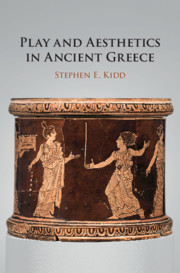Book contents
- Play and Aesthetics in Ancient Greece
- Play and Aesthetics in Ancient Greece
- Copyright page
- Dedication
- Epigraph
- Contents
- Acknowledgements
- Abbreviations
- Introduction
- Chapter 1 The Pais of Paizō: Children, Intoxication, and Play in Ancient Psycho-physiology
- Chapter 2 Why Plato Needs Play
- Chapter 3 Plato’s Play and the Tragic Paradox
- Chapter 4 What Do Pleasure-Objects Do? An Inquiry into Toys
- Chapter 5 Aristotle’s Demotion of Play
- Chapter 6 Play vs. Mimesis in Aristotle’s Aesthetics
- Chapter 7 Serious Play as Goal-Oriented Play
- Chapter 8 The Value of Serious Things before and after Death
- Conclusions: Toward a Pleasure-Model of Play
- Bibliography
- Index
Chapter 1 - The Pais of Paizō: Children, Intoxication, and Play in Ancient Psycho-physiology
Published online by Cambridge University Press: 09 May 2019
- Play and Aesthetics in Ancient Greece
- Play and Aesthetics in Ancient Greece
- Copyright page
- Dedication
- Epigraph
- Contents
- Acknowledgements
- Abbreviations
- Introduction
- Chapter 1 The Pais of Paizō: Children, Intoxication, and Play in Ancient Psycho-physiology
- Chapter 2 Why Plato Needs Play
- Chapter 3 Plato’s Play and the Tragic Paradox
- Chapter 4 What Do Pleasure-Objects Do? An Inquiry into Toys
- Chapter 5 Aristotle’s Demotion of Play
- Chapter 6 Play vs. Mimesis in Aristotle’s Aesthetics
- Chapter 7 Serious Play as Goal-Oriented Play
- Chapter 8 The Value of Serious Things before and after Death
- Conclusions: Toward a Pleasure-Model of Play
- Bibliography
- Index
Summary
- Type
- Chapter
- Information
- Play and Aesthetics in Ancient Greece , pp. 20 - 48Publisher: Cambridge University PressPrint publication year: 2019



